The J-STD-001, (Joint Industry Standard),”Requirements for Soldered Electrical and Electronic Assemblies” was first published in January 1992 as a “parallel document” to complement and subsequently replace the existing MIL-STD-2000, High Reliability Soldering Requirements. The prime difference between the two standards is that the J-STD-001 is a commercial or industrial “guide-line”, applicable to assemblies separated into “product classes” that are based on their end use environment, and to a lesser degree, the assembly costs. Unlike the J-STD-001, the MIL-STD-2000A and related standards such as WS-6536, referred to as the Navy Weapons Specification, and the MIL-S-45743 Army Soldering Specification, has only one product class. The goal of MIL Standards is to establish procedures and requirements in attaining the highest possible quality and reliability levels, for uninterrupted operation in the harshest of end use environments. Both the MIL standards and IPC J-STD were intended to serve the same purpose of providing definition and requirements in achieving a measure of quality and reliability in assemblies subjected to real field conditions.
IPC-A-610 or IPC J-STD-001. Why two electronic assembly acceptance standards? What is Worker Proficiency Certification? How is the J-STD-001 Operator Proficiency Certification different? The IPC relies on industry volunteers, working in committees, to develop the standards. The committees are apportioned into eight major function categories. One of these, the Product Assurance Committee, has responsibility for the technical content of the IPC-A-610 standard through its IPC-A-610 Task Group. The IPC-A-610 presents acceptance requirements for the manufacture of electronic assemblies. Essentially, the IPC-A-610 is a book of pictures and illustrations portraying acceptance criteria that reflect the requirements of other standards and specifications. Historically, electronic assembly standards did contain more comprehensive and tutorial information relating to principles and techniques. One consequence, the standardization of methods, resulted in conflicts because process methods changed faster than the standards. The Assembly and Joining Process Committee, with the EIA Soldering Technology Committee, developed the joint standard, J-STD-001: Requirements for Soldered Electrical and Electronic Assemblies. The IPC committee deals with automatic component placement, insertion, handling, attachment and joining techniques, as well as the cleaning operation prior to coating and encapsulation. The two documents will probably not be merged. The activities of the committees are different. We have the IPC-A-610, a picture book that provides clarification and definition to the end item requirements that should result from the use of materials, processes and design (by extension) requirements described in the J-STD-001












